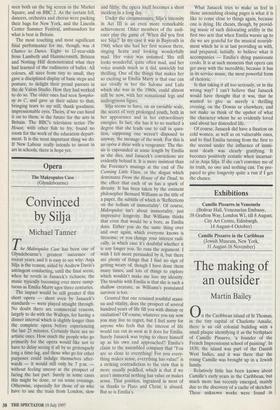Opera
Convinced by Silja
Michael Tanner
The Makropulos Case has been one of Glyndebourne's greatest successes of recent years, and it is easy to see why: Anja Silja is the reason, aided by Andrew Davis's astringent conducting, until the final scene, when he revels in Janacek's richness, the music typically becoming ever more sump- tuous as Emilia Marty ages three centuries.
The impact would be still greater if this short opera — short even by Janacek's standards — were played straight through. No doubt there are commercial reasons, largely to do with the Wallops, for having a dinner interval which is slightly longer than the complete opera before experiencing the last 25 minutes. Certainly there are no artistic ones. How much the people who go primarily for the opera would like not to have to delay seeing it all by so grotesquely long a time-lag, and those who go for other purposes could indulge themselves after- wards — it would still only be 7 p.m. without feeling uneasy at the prospect of facing the last part. Surely in some cases this might be done, or on some evenings. Otherwise, especially for those of us who have to use the train from London, slow and filthy, the opera itself becomes a short incident in a long day.
Under the circumstances, Silja's intensity in Act III is an even more remarkable achievement. Older members of the audi- ence play the game of 'When did you first see Silja?' In my case it was in Bayreuth in 1960, when she had her first season there, singing Senta and looking wonderfully mad. Her voice was untamed. She still looks wonderful, quite often mad, and her voice sounds much as it did, unwieldy but thrilling. One of the things that makes her so exciting as Emilia Marty is that one can see vividly in her the Salome and Lulu which she was in the 1960s, could almost still be now, with her sensational legs and androgynous figure.
Silja seems to have, on an enviable scale, the secret of very prolonged youth, both in her appearance and in her extraordinary energies. In fact, she has it to so marked a degree that she leads one to call in ques- tion, supposing one weren't disposed to anyway, the message of the work. For this is an opera a these with a vengeance. The the- sis is expounded at some length by Emilia as she dies, and Janacek's convictions are evidently behind it. It is more insistent than the Forester's musings at the end of The Cunning Little Vixen, or the slogan which dominates From the House of the Dead, to the effect that each of us has a spark of divinity. It has been taken by the eminent philosopher Bernard Williams as the title of a paper, the subtitle of which is 'Reflections on the tedium of immortality'. Of course, Makropulos isn't about immortality, just impressive longevity. But Williams thinks that even that would be a bore, as Emilia does. Either you do the same thing over and over again, which everyone knows is tiresome; or you change your interest radi- cally, in which case it's doubtful whether it is any longer you. So runs the argument. I wish I felt more persuaded by it, but there are plenty of things that I find no sign of getting weary of, though I have done them many times; and lots of things to explore which wouldn't make me lose my identity. The trouble with Emilia is that she is such a shallow creature, as Williams's postulated survivor is too.
Granted that one retained youthful stami- na and vitality, does the prospect of several hundred years of life fill you with dismay or exultation? Of course, whatever you say now you may live to regret, but I feel sorry for anyone who feels that the interest of life would run out as soon as it does for Emilia. Surely Janacek was trying to cheer himself up as his own end approached? Emilia's claim to the assembled company that 'You are so close to everything! For you every- thing makes sense, everything has value!' is a striking contradiction to the view that is more usually peddled, which is that if we aren't immortal nothing has value or makes sense. That position, ingrained in most of us thanks to Plato and Christ, is absurd. But so is Emilia's. What Janacek tries to make us feel in those astonishing closing pages is what it is like to come close to things again, because one is dying. He cheats, though, by provid- ing music of such dislocating aridity in the first two acts that when Emilia warms up to die we are grateful for the musical nourish- ment which he is at last providing us with, and prepared, initially, to believe what it accompanies — Emilia's dying passionate credo. It is at such moments that opera can get away with the incredible, because it has in its service music, the most powerful form of rhetoric.
Is that taking it all too seriously, or in the wrong way? I can't believe that Janacek would have thought that it was, that he wanted to give us merely a thrilling evening, on the Downs or elsewhere, and not make us think of the upshot of what the character whom he so evidently loved said about her distended life.
Of course, Janacek did have a fixation on cold women, as well as on vulnerable ones, and to find Emilia turning from the first to the second under the influence of immi- nent death was clearly gratifying. It becomes positively ecstatic when incarnat- ed in Anja Silja. If she can't convince me of its truth, no one and nothing can. I'm pre- pared to give longevity quite a run if I get the chance.


























































 Previous page
Previous page